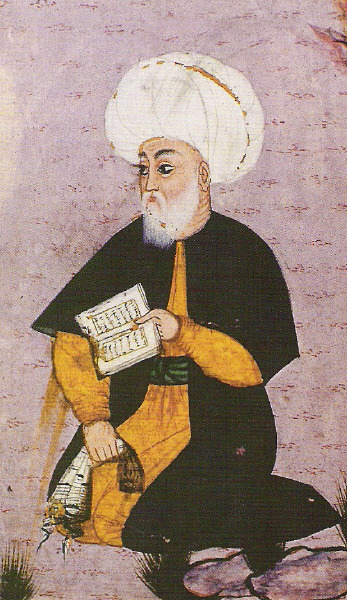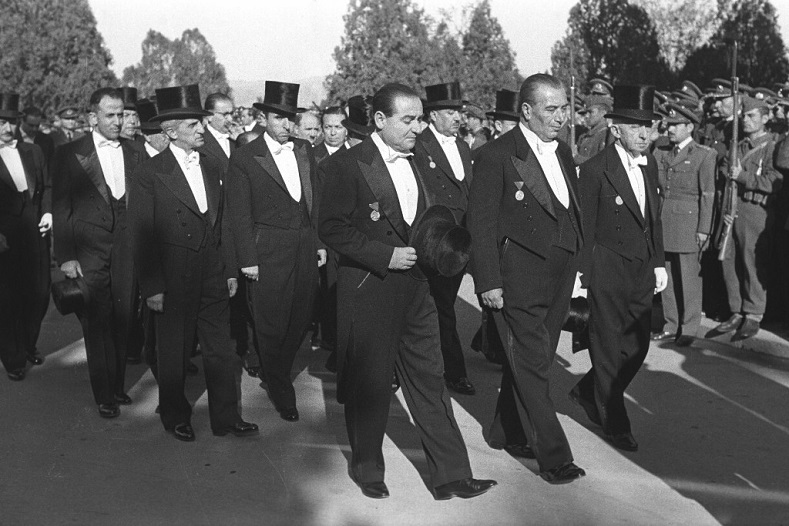|
Seven Great Poets
In Turkish culture, the Seven Great Poets or Seven Great Ozans ( tr, Yedi Ulu Ozan) are seven (singer-poets) who lived between 14th and 16th century that represent Alevi poetry and literature. Background Seven Ulu Ozan are the poets who gave their works mostly in Turkish language, although they knew languages such as Arabic and Persian, which enlighten the people about the political problems of the period. According to the belief, for the struggle for the sake of the Alevi faith and the persecution they endured, as well as the content that attracted people in their literary works influenced all Ozans that came after them. List of Seven Great Poets * Imadaddin Nasimi (14th century) * (15th century) * Fuzûlî (16th century) * Ismail Khatai (16th century) * (16th century) * Pir Sultan Abdal Pir Sultan Abdal (born Haydar) is an important religious figure in Alevism, who is thought to be of Turkmen origin and to have been born in the village of Banaz in present-day Sivas Pr ... [...More Info...] [...Related Items...] OR: [Wikipedia] [Google] [Baidu] |
Turkish Culture
The culture of Turkey ( tr, Türkiye Kültürü) combines a heavily diverse and heterogeneous set of elements that have been derived from the various cultures of the Eastern Mediterranean, Eastern Europe, Caucasia, Middle East and Central Asia traditions. Many of these traditions were initially brought together by the Ottoman Empire, a multi-ethnic and multi-religious state. During the early years of the Republic of Turkey, the government invested a large amount of resources into fine arts such as paintings, sculpture and architecture. This was done as both a process of modernization and of creating a cultural identity. People History The Ottoman system was a multi-ethnic state that enabled people within it not to mix with each other and thereby retain separate ethnic and religious identities within the empire (albeit with a dominant Turkish and Southern European ruling class). Upon the fall of the empire after World War I the Turkish Republic adopted a unitary approach, w ... [...More Info...] [...Related Items...] OR: [Wikipedia] [Google] [Baidu] |
Alevi
Alevism or Anatolian Alevism (; tr, Alevilik, ''Anadolu Aleviliği'' or ''Kızılbaşlık''; ; az, Ələvilik) is a local Islamic tradition, whose adherents follow the mystical Alevi Islamic ( ''bāṭenī'') teachings of Haji Bektash Veli, who is supposed to have taught the teachings of Ali and the Twelve Imams. Differing from Sunnism and other Twelver Shia, Alevis have no binding religious dogmas, and teachings are passed on by a spiritual leader. They acknowledge the six articles of faith of Islam, but may differ regarding their interpretation. Adherents of Alevism are found primarily in Turkey and estimates of the percentage of Turkey's population that are Alevi include between 4% and 15%. Etymology "Alevi" () is generally explained as referring to Ali, the cousin and son-in-law of Muhammad. The name represents a Turkish form of the word ''‘Alawi'' ( ar, علوي) "of or pertaining to Ali". A minority viewpoint is that of the Ishikists, who assert, "Alevi" was de ... [...More Info...] [...Related Items...] OR: [Wikipedia] [Google] [Baidu] |
Fuzûlî
Mahammad bin Suleyman ( Classical Azerbaijani: ), better known by his pen name Fuzuli ( az-Arab, فضولی ; ; * ota, محمد بن سلیمان فضولی ; * fa, محمد بن سلیمان فضولی . – 1556), was a 16th century poet, writer and thinker, who wrote in his native Azerbaijani, as well as Arabic and Persian languages. Considered one of the greatest contributors to the divan tradition of Azerbaijani literature, Fuzuli in fact wrote his collected poems (divan) in all three languages. He is also regarded as one of the greatest Ottoman lyrical poets with knowledge of both the Ottoman and Chagatai Turkic literary traditions, as well as mathematics and astronomy. Life Fuzûlî is generally believed to have been born around 1480 in what is now Iraq, when the area was under Ak Koyunlu Turkmen rule; he was probably born in either Karbalā’ or an-Najaf. He was an Azerbaijani descended from the Turkic Oghuz Bayat tribe, who were scattered through ... [...More Info...] [...Related Items...] OR: [Wikipedia] [Google] [Baidu] |
Imadaddin Nasimi
Alī Imādud-Dīn Nasīmī ( az, Seyid Əli İmadəddin Nəsimi سئید علی عمادالدّین نسیمی, fa, عمادالدین نسیمی), often known as Nesimi, was a 14th-century Azerbaijani Ḥurūfī poet. Known mostly by his pen name of Nasimi, he wrote in Azerbaijani, Persian and sometimes Arabic, being the composer of one ''divan'' in Azerbaijani, one in Persian, and a number of poems in Turkish and Arabic. He is considered one of the greatest Turkic mystical poets of the late 14th and early 15th centuries and one of the most prominent early divan masters in Turkic literary history. According to the third edition of the ''Encyclopedia of Islam'' Nasimi "is considered to be the true founder" of Turkic classical''ʿarūḍ'' poetry. Name and titles The third edition of the ''Encyclopedia of Islam'' notes that according to some sources, including Sibṭ Ibn al-ʿAjamī (died 1415), Nasimi's given name was Ali. The name "Nasimi" was the pen name (''makhla ... [...More Info...] [...Related Items...] OR: [Wikipedia] [Google] [Baidu] |
Fuzuli (writer)
Mahammad bin Suleyman ( Classical Azerbaijani: ), better known by his pen name Fuzuli ( az-Arab, فضولی ; ; * ota, محمد بن سلیمان فضولی ; * fa, محمد بن سلیمان فضولی . – 1556), was a 16th century poet, writer and thinker, who wrote in his native Azerbaijani, as well as Arabic and Persian languages. Considered one of the greatest contributors to the divan tradition of Azerbaijani literature, Fuzuli in fact wrote his collected poems (divan) in all three languages. He is also regarded as one of the greatest Ottoman lyrical poets with knowledge of both the Ottoman and Chagatai Turkic literary traditions, as well as mathematics and astronomy. Life Fuzûlî is generally believed to have been born around 1480 in what is now Iraq, when the area was under Ak Koyunlu Turkmen rule; he was probably born in either Karbalā’ or an-Najaf. He was an Azerbaijani descended from the Turkic Oghuz Bayat tribe, who were scattered through ... [...More Info...] [...Related Items...] OR: [Wikipedia] [Google] [Baidu] |
Ismail I
Ismail I ( fa, اسماعیل, Esmāʿīl, ; July 17, 1487 – May 23, 1524), also known as Shah Ismail (), was the founder of the Safavid dynasty of Safavid Iran, Iran, ruling as its King of Kings (''Shahanshah'') from 1501 to 1524. His reign is often considered the beginning of History of Iran, modern Iranian history, as well as one of the gunpowder empires. The rule of Ismail I is one of the most vital in the history of Iran. Before his accession in 1501, Iran, since its Muslim conquest of Persia, conquest by the Arabs eight-and-a-half centuries earlier, had not existed as a unified country under native Iranian peoples, Iranian rule, but had been controlled by a series of Arab Caliphate, caliphs, Seljuk Empire, Turkic sultans, and Ilkhanate, Mongol Khan (title), khans. Although many Iranian dynasties rose to power amidst this whole period, it was only under the Buyid dynasty, Buyids that a vast part of Iran properly returned to Iranian rule (945–1055). The dynasty foun ... [...More Info...] [...Related Items...] OR: [Wikipedia] [Google] [Baidu] |
Pir Sultan Abdal
Pir Sultan Abdal (born Haydar) is an important religious figure in Alevism, who is thought to be of Turkmen origin and to have been born in the village of Banaz in present-day Sivas Province, Turkey. He is considered legendary among his followers. His life is reconstructed from folkloric sources, especially religious poems which are believed to have been composed by himself and transmitted by ashiks. However, his attribution is considered problematic. During the Ottoman–Persian Wars, he supported religious heterodoxy and the political subversion of Anatolia which got him hanged. See also * Alevism * Kurdish Alevism Kurdish Alevism () refers to the unique rituals, sacred place practices, mythological discourses and socio-religious organizations among Kurds who adhere to Alevism. Moreover, Kurdish Alevis consider their hereditary sacred lineages as semi-deifi ... References Executed people from the Ottoman Empire People executed by the Ottoman Empire by han ... [...More Info...] [...Related Items...] OR: [Wikipedia] [Google] [Baidu] |
Alevism
Alevism or Anatolian Alevism (; tr, Alevilik, ''Anadolu Aleviliği'' or ''Kızılbaşlık''; ; az, Ələvilik) is a local Islamic tradition, whose adherents follow the mystical Alevi Islamic ( ''bāṭenī'') teachings of Haji Bektash Veli, who is supposed to have taught the teachings of Ali and the Twelve Imams. Differing from Sunnism and other Twelver Shia, Alevis have no binding religious dogmas, and teachings are passed on by a spiritual leader. They acknowledge the six articles of faith of Islam, but may differ regarding their interpretation. Adherents of Alevism are found primarily in Turkey and estimates of the percentage of Turkey's population that are Alevi include between 4% and 15%. Etymology "Alevi" () is generally explained as referring to Ali, the cousin and son-in-law of Muhammad. The name represents a Turkish form of the word ''‘Alawi'' ( ar, علوي) "of or pertaining to Ali". A minority viewpoint is that of the Ishikists, who assert, "Alevi" was de ... [...More Info...] [...Related Items...] OR: [Wikipedia] [Google] [Baidu] |




_of_Fuzuli_-_Muhammad_bin_Sulayman_known_as_Fuzuli.jpg)
